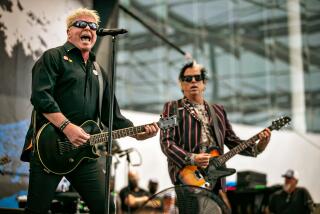Jimmy’s modest appetite
- Share via
The band Jimmy Eat World may have sold 1.3 million copies of its 2001 album, “Bleed American,” but it’s not counting on anything with the Oct. 19 release of its follow-up, “Futures.”
“It could come back down to us having nothing again,” says singer-guitarist Jim Adkins. “That’s why we haven’t sold our van yet.”
Yes, the Phoenix-based band still has the Ford Club Wagon van it bought in 1996, a vehicle with 250,000 miles on the odometer that got the group through some pretty lean times. Jimmy Eat World struggled for several years with several largely overlooked albums, was dropped by Capitol Records in 2000, and made “Bleed American” on its own with limited expectations before signing with DreamWorks Records (now part of Interscope Records). And even after that, the group had to get over such hurdles as radio stations stopping airplay on the title song because of cultural raw nerves in the wake of the Sept. 11 terrorist strikes. But ultimately the combination of pop appeal and tireless touring built the album into a hit.
Jimmy Eat World probably doesn’t have to worry about keeping the van tuned up at the moment, though. It’s certainly going to be traveling in higher style with the new album. Not only is it poised to build on the success of the last album, but in the course of that success the group emerged as one of the standard bearers for an emerging generation of rockers.
The band clearly has raised the stakes. Where past Jimmy albums were largely produced by the band on relative shoestring budgets, the new one was overseen by Gil Norton, a veteran with credits from the Pixies’ influential albums to last year’s major-label debut by Dashboard Confessional. The sound of this record is big and bold, a solid move into the modern-rock mainstream -- even featuring a guest vocal appearance by Liz Phair on the song “Work” and elegant orchestral touches from arranger David Campbell.
“With the previous album doing so well, it was not only a factor of our means in making this record but also behind a creative decision to tighten things up and make this concise record,” Adkins says. “This is the most ‘studio’ record we’ve made. We were basically not restricting ourselves from something if we felt we could make a song better. If that meant recutting from scratch, we did that.”
Adkins demurs the notion of his band leading anything, but the sales patterns of the last album stand as a model for others rising in the so-called emo-rock scene, where earnestness of emotion is the premium. “Bleed American,” after weathering the 9/11 resistance, built sales at an impressively steady and solid rate, its best single week being 32,000 a full year after its release.
“This is exactly the track record you look for when you want to see a band make that next step,” says Geoff Mayfield, Billboard magazine’s director of charts and senior analyst. “And it’s been a good year for this kind of music.”
Such other emo-related bands as Yellowcard have had similar sales patterns, with its third album, “Where We Stand,” logging 31 weeks in the Top 200 and sales increasing to nearly 34,000 last week. And Taking Back Sunday, one of the jewels of the hot independent label Victory Records, of offers its brand-new “Where You Want to Be” album.
Now Jimmy Eat World seems poised to rise to the top of that world, though first-week sales are hard to predict with radio play and other factors to be figured in. But it will certainly far surpass any single week of sales the band has experienced before, and could signal the full mainstream arrival of its brand of music and aesthetic, one that is almost an anti-fashion stance.
“What’s interesting about Jimmy Eat World is so many bands now are forced to appropriate the look and feel of what’s in pop culture, but because of their success, they’re free to just be Jimmy Eat World,” says Luke Wood, the Interscope senior vice president of A&R; who signed the band at DreamWorks.
For Adkins, the goals have already been met.
“No matter how the record does, I think it’s the kind of record that will solidify our ability to continue to make records,” he says. “Even if it’s a disappointment commercially, the people who like our band will like this record and we’ll continue to get to be a band.”
OK Go out there and take a stand!
While many artists are writing songs that incorporate political sentiments, OK Go singer Damian Kulash instead has written a manifesto about political activism as a guide for other musicians.
Titled “How Your Band Can Fire Bush,” the document is intended to provide inspiration and ammunition for those who are standing on the sidelines wondering whether they should get involved.
“I came across a lot of people who wanted to do something but didn’t know how and felt one fact short of a coherent argument,” says Kulash, who lives in Los Angeles and whose band appeared at a recent bake sale benefiting Sen. John Kerry’s presidential campaign.
“The more I got myself in that wedge between artists who wanted to do something and activists who wanted them to do something, I thought what we needed was a 15-minute primer on how easy it is to do something and what the basic tools are.”
The guide is part cheerleading, telling musicians that they are the “loudest, most effective voice that the political left has,” part action handbook (suggestions of how to reach out to fans via concerts and the Internet) and part background briefing (outlining some essential issues and listing the “swing” states both for the presidential vote and congressional and gubernatorial races).
The document can be found on the band’s website, www.okgo.net, and has been e-mailed to many artists, managers and label executives.
Obviously, Kulash is not making any pretense of neutrality, but he says that the bottom-line division in the country is not between the left and the right or blue states and red states.
“The thing that has gotten me most involved in politics now is the huge divide between what seems are the political people and the other people,” he says. “As people get sucked into their camps on the left and the right, the people in the middle get less and less vocal and less ultimately happens.”
More to Read
The biggest entertainment stories
Get our big stories about Hollywood, film, television, music, arts, culture and more right in your inbox as soon as they publish.
You may occasionally receive promotional content from the Los Angeles Times.







